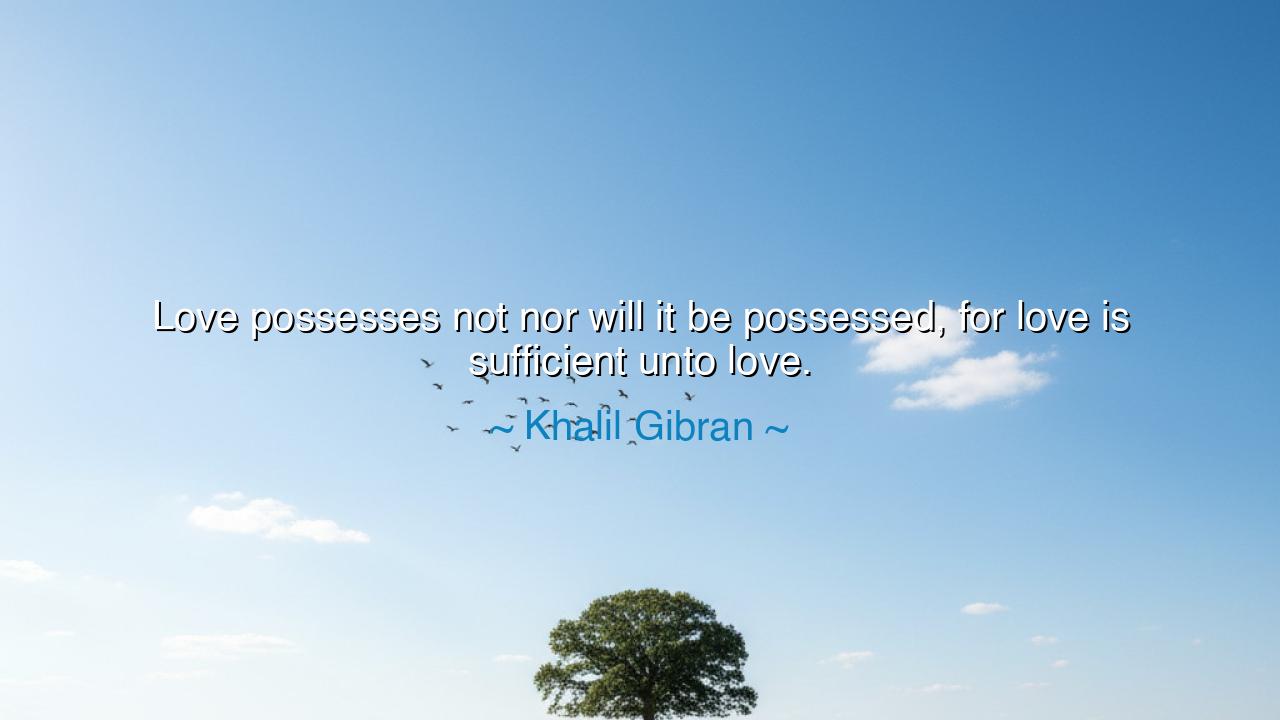
Love possesses not nor will it be possessed, for love is






"Love possesses not nor will it be possessed, for love is sufficient unto love." These words from Khalil Gibran strike at the very heart of what it means to love without constraint, to experience love not as a possession or a means to an end, but as a force that is inherently free and self-sustaining. In this powerful reflection, Gibran challenges the traditional view of love as something we own or control, as if it were an object to be possessed. Instead, he offers a vision of love as something that, in its purest form, exists on its own, beyond the limitations of ownership or expectation. True love, according to Gibran, is not bound by the need to possess or be possessed; it is sufficient unto itself, flourishing in its freedom and autonomy.
The ancients understood love in much the same way, recognizing that it could neither be confined nor controlled. In Greek philosophy, Plato explored the nature of love in his Symposium, describing eros as a force that transcends physical desire and seeks the beauty of the soul. Plato believed that love, at its highest form, was an ascent from the earthly and fleeting to the divine and eternal. It could not be possessed in a literal sense, for its true essence was boundless, moving the lover from desire for a single object to a profound yearning for the absolute. For Plato, eros was the desire for connection with something greater than oneself, something that could never be fully owned but could be experienced in fullness. This aligns closely with Gibran’s view that love, in its deepest sense, is not about ownership but about a shared transcendence.
In Roman mythology, the love between Venus and Mars illustrates this concept of love as something that cannot be confined to the material world. Their relationship was passionate, yet marked by instability and freedom. Venus, the goddess of love, represented the idea of love as a force of inspiration and beauty, while Mars, the god of war, embodied the more fierce and untamed aspects of love. They were lovers, yet neither could possess the other completely, for their love was wild, driven by forces beyond control. In their love, as in Gibran’s vision, there was no dominion, only a union that transcended earthly boundaries. Their love was not something that could be owned or controlled but was a force that moved and shaped them, constantly evolving and elusive.
Consider the story of Abelard and Heloise, whose love, though tragic, also illustrates the freedom Gibran speaks of. Abelard, the philosopher, and Heloise, his brilliant and independent student, fell in love, but their relationship was marked by separation, betrayal, and loss. Yet, even through the suffering and distance, their love remained a constant, transcending the boundaries of their lives. Abelard's writings to Heloise reflect that, though they could never fully be together, the love they shared could not be possessed by anyone, not even by time or separation. In their story, love was not bound by physical presence or possession; instead, it was an eternal bond, something that belonged only to itself. It was a freedom that neither time nor circumstance could restrict, much like Gibran’s teaching that love is sufficient unto itself.
In modern relationships, we often encounter the tension between desire for connection and the tendency to try to control or possess the other person. We seek to define love in terms of ownership, as if the other person must belong to us in a certain way to prove that the love is real. Yet, the most fulfilling relationships are often those that embrace the freedom and independence of each individual. True love, as Gibran suggests, does not require possession, nor does it thrive on control. It exists in the freedom to be oneself, to love without restraint, and to allow the other person the space to be who they truly are. This is the magic of love, the ability to cherish without the need to possess, to love fully without expectation or ownership.
The lesson here is clear: love cannot be possessed, for its very essence is freedom. To love truly is to love unconditionally, without the desire to control or own the other person. It is to appreciate the person for who they are, without trying to shape them into something that suits our own desires. When we love in this way, we not only give freedom to the other, but we free ourselves as well. Love, in its truest form, is not about possession; it is about connection, shared understanding, and mutual respect. By loving without the need to own or control, we create space for a love that is unconditional and everlasting.
Therefore, my children, let your hearts embrace the wisdom of Khalil Gibran. Love is a force that cannot be bound or possessed. It is free in its truest form, and it is only in freedom that love can truly flourish. Let love be something that you give freely, not something that demands ownership or control. In loving without expectation, you will find the most pure and liberating connection, one that transcends the limitations of possession and touches the eternal. Allow love to be its own force, and in doing so, you will discover that love, in its most authentic form, is all you need to be whole and free.






AAdministratorAdministrator
Welcome, honored guests. Please leave a comment, we will respond soon